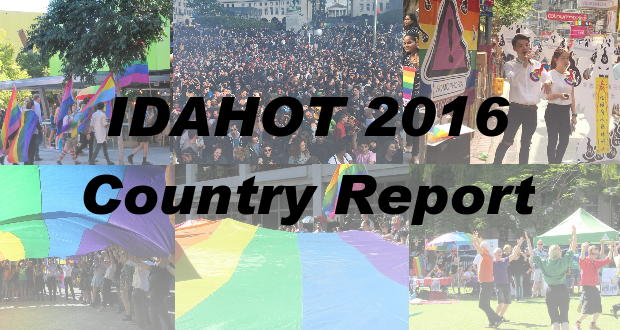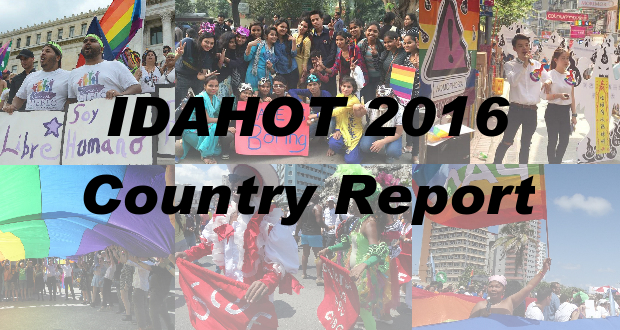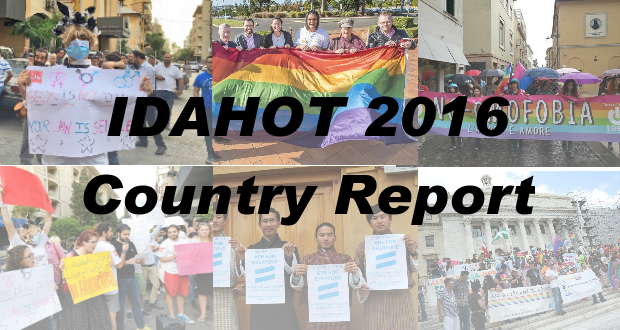The United Kingdom once again showed an amazing commitment to IDAHOT, with a whole host of events and actions held across England, Wales, Scotland and Northern Ireland. Efforts in support of the day were also seen on an international scale, and from within the political establishment.
The British Foreign & Commonwealth Office, the central body for all UK diplomatic and foreign affairs matters, held a number of events in support of IDAHOT 2016, as well as online messages of support that were seen in ost of the countries they operate in.
The office also published a number of short videos featuring staff and members of the international LGBT community. Videos and further messages were shared through the FCO’s social media pages, through the #IDAHOT hashtag.
On social media the UK was one of the most active countries, with tens of thousands of tweets coming from the country alone. IDAHOT 2016 trended throughout the day, and led to an incredible amount of discourse and dialogue.
In response to the IDAHOT 2016 theme, several organisations took part in actions focused on mental health and wellbeing. Coventry University this year released a new edition of their Psychology of Sexuality reviews with a specific IDAHOT focus. The publication will feature research and discussion over sexuality and how campaigners can apply scientific findings to improve their work. Universities across the country also supported the day with talks, workshops and the publication of resources and guides for students.
London the Kaleidoscope Trust held their annual IDAHOT lecture, featuring a talk and panel discussion on mental health and the LGBT community.
Also in London the Lloyds Banking Group hosted a free public screening of the British comedy film Pride, which tells the story of LGBT protestors joining the British mining strike in the 1980s.
In Brighton, The British Psychological Association held a public seminar on marriage equality. The event is free to all members and non-members and will feature insights from some of the leading academics in British psychology. The BPA also held a special online discussion on mental health, psychology and sexuality, which invited members of the public to share questions on mental health and sexuality. The action helped promote much online discussion, and also provided valuable information for many members of the LGBT community.
Across the country community groups held events a huge number of events to support their local LGBT community. In Leamington Spa, LGBTI individuals and allies gathered for the Big Rainbow Picnic to mark IDAHOT 2016. In Bradford the Equality Partnership hosted a day of performance and talks around the theme of health and wellbeing in the LGBTI community. In Shrewsbury, the Shropshire Rainbow Film Festival held a special screening about LGBTI activism in Ukraine. In Brighton, the Brighton and Hove LGBT Community Safety Forum joined together with other local activists for a day of live performances and talks that included a ‘minute of noise’ in commemoration of the victims of LGBTI violence.
In North West England the Proud Trust presented their ‘Pink Box’ creations made during LGBT History Month. The Pink Box campaign involved young LGBTI people exploring philosophy and philosophy in order to ‘create their own belief system’ in order to explore the link between religious beliefs and LGBTI equality.
In Manchester the LGBT Foundation held a public hate crime vigil to mark IDAHOT 2016. Other members of the city’s LGBT community also came together to celebrate the life of computer scientist Alan Turing with a miniature memorial unveiling.

In Reading the Reading University Student Union hosted a small number of events across the day, including a flag raising ceremony, workshops and talks on gender identity and allyship in LGBT campaigning.
In Kent, health campaign Kent Brook visited several schools through the week of IDAHOT to discuss discrimination and stigma with young people and teachers. The efforts were part of an ongoing campaign during which the group hopes to address issues facing young LGBT people and to tackle in-school discrimination through their talks.
In Cheltenham (Gloucestershire), members of the local IDAHOT group held public sessions on mental health, wellbeing and stigma. The first talk will focus on the theme of ‘Mental Health and Wellbeing’ while the second will address LGBT Children and Parents and the issues they face.
In Scotland, Dumfries and Galloway council marked the day by promoting their newly-launched anti-discrimination guidelines. The authority will also hope to raise awareness of discrimination through a number of events during the day. Similar actions were also seen in Fife, Glasgow, Aberdeen and Edinburgh.

Also on the day, the Gay Police Association of Scotland ran a special online videocast on hate crimes and discrimination in the UK. Action was also seen from police forces across the country, many of whom supported the day through their Special Victims Unit, and through the promotion of anti-hate crime resources and public displays of solidarity.



